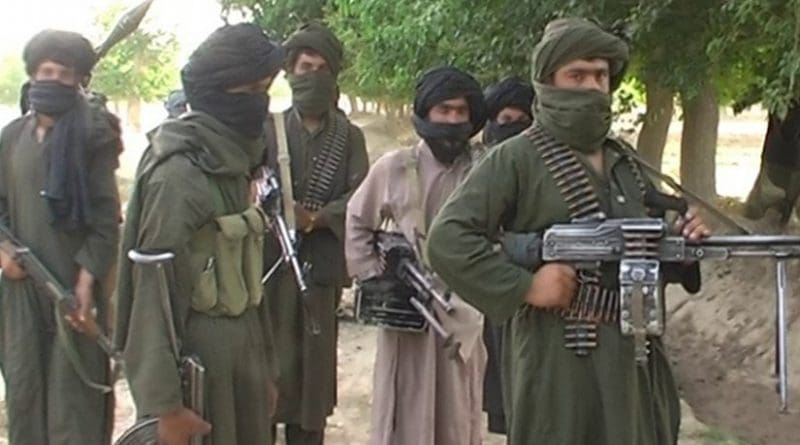How Far Will Pakistan Use Its Taliban Leverage – Analysis
By Mahendra Ved*
Sartaj Aziz, Foreign Affairs Advisor to Pakistan’s Prime Minister, has, for the first time by a top member of the establishment, acknowledged that Pakistan has influence over the Afghan Taliban and that they were living in Pakistan. He was revealing what the world has known all along – that the Taliban operate out of Quetta and Peshawar. Their two ‘shooras’ the traditional assemblies, operate under these names, from these cities.
For 15 years, Pakistan has never really acknowledged the presence of the Taliban leadership on its soil when ground reality dictates that they could not be elsewhere. They could only be among their fellow Pushtuns. Islamabad has always held that the Taliban were living on and operating from Afghan territory.
However, it is from Pakistani soil that they have spawned and grown from groups of armed refugees of end-2001 to carry out successful military operations across the border. Today, they have more Afghan countryside under their sway, including the northern region, than then did before when they wielded power in Kabul.
Interacting with scholars at the Council for Foreign Relations, Washington, Aziz talked of Afghan Taliban leaders having their homes, their children receiving education and their families receiving medical treatment while in Pakistan. He said that Islamabad could ‘leverage’ this on the Taliban and ‘force’ them to negotiate with Kabul.
If so, why is it not doing so? And if it is doing as reports indicate, why is it selective, in allowing only those Taliban leaders who listen to Islamabad to participate in these talks? Those who are perceived as independent minded have been successfully prevented from having any contact, any role, in talks.
This is what the United States has been asking when it urges Islamabad to “do more” to facilitate negotiations between the Taliban and the Kabul regime, especially after Ashraf Ghani became Afghanistan’s President.
Having made what seem tactical admissions/revelations, Aziz contended that the Afghan Taliban do not necessarily listen to all that Islamabad says or asks them to do. They have always acted in their national interest. He cited the rejection of the plea to spare the Buddha statues in Bamiyan that the Taliban destroyed in 2000.
He may be right. Even when in power in Kabul, and dependent upon Islamabad for contact with the outside world, and economic and military support, the Taliban regime did not accept the Durand Line as the Afghanistan-Pakistan border. Question arises whether Aziz, an ace diplomat, had the endorsement from the military establishment that controls the Afghanistan policy to engage in such candid talk. The possibility is that he may have gone to Washington after detailed discussions and preparations.
His statements tell off Kabul that often accuses Islamabad of blocking talks in one way or the other and fomenting insurgency. They also send a message to the partners in the four-nation effort to facilitate talks, especially China and the United States, trying to lay down limits to what Islamabad could do. What Aziz said is in line with what Prime Minister Nawaz Sharif told the Americans of the limits to which Pakistan could act, or could be expected to act, vis a vis the Afghan Taliban. He had said that Washington or anyone else could not ask Pakistan to combat the Taliban and, at the same time, expect to bring them to the negotiation table with Kabul.
Aziz told the American think tank that Pakistan could not speak for, or negotiate on behalf of the government in Kabul. Of course, it cannot. There is serious trust deficit between Kabul and Islamabad at official and popular levels. Pakistan’s woman lawmaker Shazia Marri flew from Karachi to Kabul on March 1 to participate in the Pakistan-Afghanistan Beyond Boundaries Track II initiative. “The organizers couldn’t make it to the protocol to receive her because the entire airport and the road leading to it had been literally sealed off due to two VVIP movements. She was questioned for 25 minutes and made to wait,” says a report in The Friday Times.
There is little doubt that Islamabad feels bolstered by the policy of the Obama administration, now in the evening of its tenure, to keep reducing the strength of the US forces – it may be reduced to just 5,500 this summer – and ensure that there is no flare-up of any kind on the Af-Pak front.
The other reason for Pakistan’s growing confidence on the Afghan issue is the involvement of its biggest ally, China. It is a moot point whether Chinese diplomatic (also economic) presence in Afghanistan is in direct proportion to the declining American influence – even as Washington strives to promote its ‘pivot’ in Asia.
*Mahendra Ved can be contacted at [email protected]

